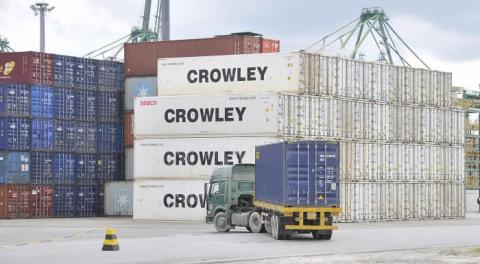
There is a high rate of control of merchandise, both for imports and exports, since 100% of the containers are inspected, and they are physically controlled, according to the established parameters of selectivity.
In 2017, Cuba signed the Memorandum for the establishment of the Container Control Program (CCP), an initiative of the United Nations Office on Drugs and Crime and the World Customs Organization, which allowed the detection of illegal acts by our country, thanks to the systematic work on the border.
In general, the CCP covers 99% of the containers that carry out foreign trade operations on the island, said Alberto Areán Varela, regional coordinator for Latin America and the Caribbean of that international organization, in an exclusive interview with Granma.
He pointed out that, in the beginning, the operations were centered in the port of Mariel and, at this moment, it already includes the roadstead of Santiago de Cuba and the José Martí international airport, in Havana.
We have a well-defined objective within the Program – to which, he considered, its success is due – and it is the facilitation of trade, through safe ports and airports, preventing the cross-border movement of illegal merchandise, he said.
In the case of maritime cargo, he explained, the world is moving about 800 million TEUs (a measure used in foreign trade to calculate the loading capacity of containers) per year, which means that approximately 85% of the global economy is made by containers in this way.
For this reason, he stressed that the security criterion is fundamental and, in this sense, the CCP trains the personnel with a defined methodology that takes into account risk indicators, which is complemented by the security measures established by each country.
In the case of Cuba, Areán Varela pointed out, there is a high rate of control of merchandise, both import and export, since 100% of the containers are inspected, and they are physically controlled, according to the parameters established selectivity.
He stated that this hard work has led other international organizations to certify Cuba as complying with good practices in this area.
Since the beginning of the CCP on the Island, he said, the behavior has been one of growth, adding that the will is to expand this program that, according to the structures themselves, can only work in close liaison with government authorities.
MORE TRAINING, MORE SAFETY
The Container Control Program has offered since its inception basic, theoretical, practical and training training
specialized in risk management, cultural heritage, documentary analysis and other criteria that are also the responsibility of organizations such as the Ministry of the Interior.
The success of the CCP, he highlighted, is not so much the training as the follow-up activities and the analysis of those aspects that can be improved, an action that is not only exclusive to Cuba, but also to all the countries that make up the organization.

Leave your comment